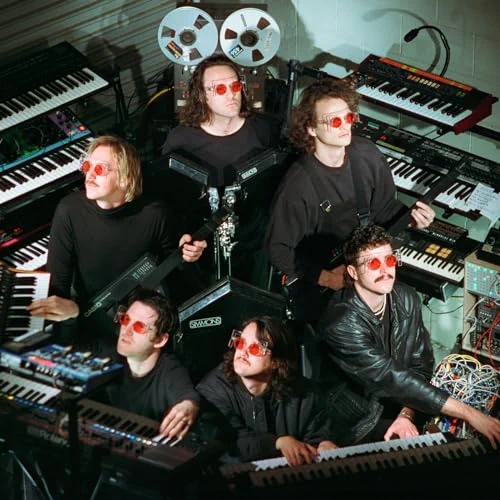
Ryan Reed on November 22, 2023
There’s a fine line between “fun creative prompt” and “tired gimmick,” but fortunately King Gizzard & The Lizard Wizard have always steered clear of the latter. Over the course of 24 studio albums, they have (among numerous other experiments) explored the rarely charted realms of microtonal tuning, edited jams into structured songs and established strict sonic parameters for various projects— lovingly tapping into thrash metal, suite-form prog and electronica. (One of their most fascinating works was a sort of “failure” in execution: 2019’s Fishing for Fishies began its life with a quest for blues and boogie, but it wound up in a much weirder space, incorporating synth[1]prog and sunshiny psych-pop into the ingredient-rich gumbo.) The prompt, it seems, is the point—a way of shaking songs loose. And it’s working pretty damn well. The Australian shapeshifters seem to constantly one-up their own prolificacy—they released a mind[1]boggling five records in 2022 followed by a pair in 2023. (Only two, dudes? Get it together!) Their latest, The Silver Cord, reaches a new peak of conceptual focus: Hyped up after drummer Michael Cavanagh bought an electronic Simmons kit—the brand most famously used throughout the ‘80s by everyone from Rush’s Neil Peart to Duran Duran’s Roger Taylor—the Gizz guys hung their guitars on the wall and dusted off their keyboards. (The album cover is a hat-tip to the contents inside: The stoic sextet are literally encircled by synthesizers, each member evoking vintage Geddy Lee with their red[1]tinted sunglasses.) The second, even higher-brow prompt is in the release strategy. They recorded two versions of this thumping, demented electro-rock album—a tighter, no-frills version and another with rambling “extended mixes” inspired by Donna Summer’s work with producer Giorgio Moroder. The latter edition is a bit fatiguing for everyone but diehards, but more frustrating is the general goofiness streaked throughout the track list’s back half, including the cringe[1]worthy rapping and chanting on “Gilgamesh.” Nonetheless, brilliance emerges through the fog of dance[1]club drumming and repetitive synth-bass—particularly when they lean toward the proggier end of the spectrum with “Theia” and the title cut, back-to-back bangers that ascend to their typical thrill-per[1]second heights. The quest continues.
